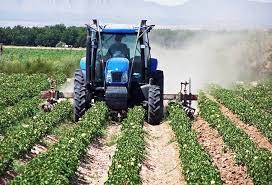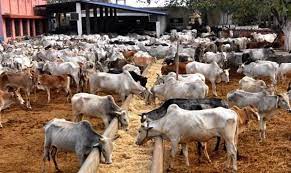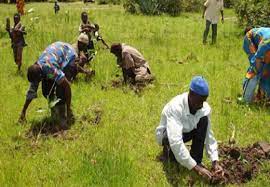Every new administration sets targets which shape its focus within a four-year period but politics and lack of political will most times derail most of these policies. In this write-up, JOHN OBA x-rays the agenda of the new minister of agriculture, Senator Abubakar Kyari.
According to Wikipedia, planning is the process of thinking regarding the activities required to achieve a desired goal. Planning is based on foresight, the fundamental capacity for mental time travel. The evolution of forethought, the capacity to think ahead, is considered to have been a prime mover in human evolution.
This is the first decision of every focused leader across all levels of governance; hence Ministers under the current administration are all rolling out plans that would guide their operations.
President Bola Ahmed Tinubu, some weeks ago revealed his eight points agenda for the country which includes food security; ending poverty; economic growth and job creation; access to capital; improving security; improving the playing field on which people and particularly companies operate; rule of law; and fighting corruption. This is even as he declared an immediate state of emergency on food insecurity to tackle the increase in food prices, placing serious responsibility on the Ministries of Agriculture and Food Security and the Federal Ministry of Water Resources and Sanitation and invariably on their ministers.
In line with this, the Ministers of Agriculture and Food Security came up with their own focus for the next four years.
The plans which looks so bogus comprising of immediate, short, medium and long term goals focuses on Food Security; Economic Growth and Job Creation; Poverty Eradication; Inclusivity (Youths and Women) and enabling environment for individuals, groups, and the private sector to participate in governance and economic activities.
Unveiling the plan on Friday, the Minister, Abubakar Kyari, said the ministry under their watch will consider a multifaceted and multi-pronged approach to the attainment of our core objectives as a critical success factor. “Accordingly, the Ministry shall engage with other Ministries, Departments, and Agencies (MDAs) and State Governments towards addressing all issues impacting the attainment of our national food security objectives.
“The Federal Ministry of Agriculture and Food Security under our watch shall be guided by some lessons learned in the implementation of the National Agricultural Technology and Innovation Policy (NATIP) which was launched for 2022 -2027. Many of the initiatives and programs being implemented by the Ministry from 2022 to date were the focus of our engagements with the Ministry staff.”
He said the Ministry is in the process of carrying out a robust Stakeholder analysis that will produce a working stakeholder map showing who does what, where and how and what are the mutually beneficial areas for the small holder farmers, large scale farmers, processors, marketers and the organized Private Sector.
“This in itself will bring about resource-use efficiency while reducing duplication and wastages.”
Eight plans
The immediate plan consists of eight plans which includes; to hold the first National Agriculture and Food Security Summit in November 2023, Certification of available planting materials for some food security crops in readiness for dry-season farming; Aggressive promotion and preparations for dry season farming which commences from November this year; Implementation of the dry season Wheat production starting in November 2023 as part of the National Agricultural Growth Scheme and Agro Pocket (NAGS-AP) projects funded by the African Development Bank. Under this scheme, the target is to produce over 70, 000 hectares of wheat across the wheat production zone of the country with an expected yield of 875,000 metric tonnes for our food reserve.
While the short terms plan which consist of 23 goals part of which is to; Develop a standard framework and guide for ‘Ease of Doing Agriculture and Food Security (EDAFS)’ operations/projects/business in Nigeria; Agriculture and Food Security Stakeholders’ analysis and mapping; make significant investment in animals feed-crop, fodder and pasture production as an antidote to the farmers and herders clashes by focusing the development of paddocks, foliage and fodder estates equipped with necessary facilities for all year round production; strengthen agriculture and food security institutions and repositioning them for the tasks ahead.
The medium term plans consist of 14 focus areas and the long term plans focus on 15 points.
Prominent plans
Prominent among the plans are the planned introduction of Fintech solutions, and creation of wallets for all financial disbursements to deliver directly to the targeted end users like it was during the time of Dr. Akinwumi Adesina.
Also the planned use of digital and DEFI solutions to reform the Bank of Agriculture and Nigerian Agricultural Insurance Corporation among others; planned special intervention to increase productivity target 10 per cent annual growth rate of meat, dairy, eggs, fish and other protein from animal sources; promotion of the establishment of agricultural marketing incubation centres (Agribusiness Development Centres) for youth and women across the ix (6) geo-political zones and planned reform of the National Agricultural Research System to serve as the engine of growth for innovative solutions to strategic value chains, increase productivity -yields of our food security and export crops, livestock, and fisheries.
Challenges
There are several challenges the ministers are billed to confront, first is the low budget allocation to the sector. According to the Maputo Declaration on Agriculture and Food Security, each member state is expected to allocate 10 per cent of its national budget to agriculture development. It is evident that no administration has achieved that fate in Nigeria since after the declaration. In fact, no administration has achieved 3 per cent. Another challenge the plan may encounter is the lack of a specific timeline to guide the implementation of the plans and to enable proper tracking of the progress made.
Also, the lack of Foreign Direct Investment or backward integrations of agro companies, has given rise to low investment and productivity. According to the National Bureau of Statistic (NBS) report, Nigeria experienced a shortfall of $18.6 billion in foreign direct investments in the last four years.
The lackadaisical attitude of the ministry’s staff towards the implementation of previous action plans, especially those in charge of the ministry’s core mandate and the corrupt tendencies of some may derail the achievement of these plans.
In addition, the plethora of political farmers who always take advantage of government interventions in the sector; many of these people always find ways to sabotage government’s plans using civil servants. Also, the lack of data of real farmers that would enable the government measures its progress in the sector. More alarming is the rejection of Nigeria’s export produced by the Western countries due to harmful chemical residue and low standard. Also the high price of petroleum has impacted every part of the economy. These and more are the challenges the current administration is faced with.
Expectations
Nigerians expectations from this administration is huge, in the light of the high price of food and low purchasing power of the common man, hence the current administration would be looking at the sector as one of the major sectors that would help cushion the effect of the hardship brought about by the oil subsidy removal that has endanger high prices of commodities in the market.




